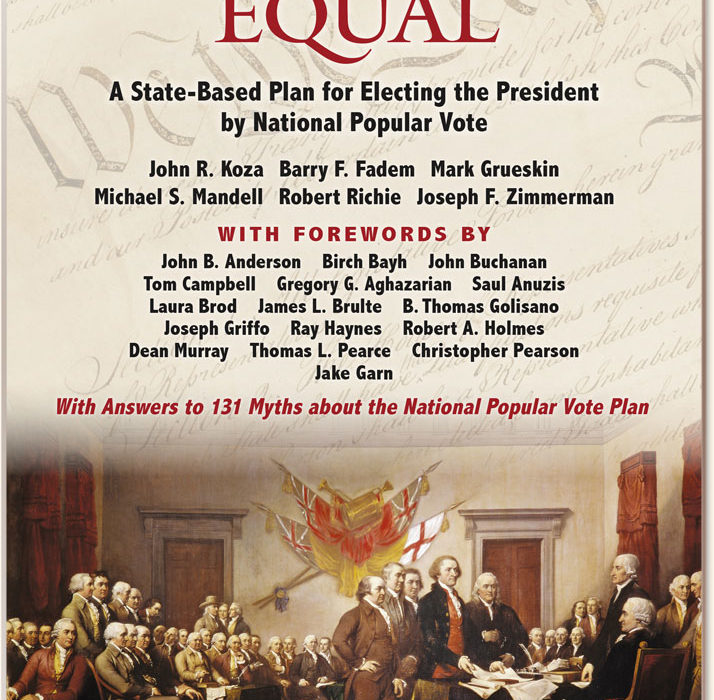National Popular Vote: Interstate Compact Legislation is Delaware Law
National Popular Vote : Make every vote equal

National Popular Vote produced research and responses to the question in this resource
National Popular Vote Interstate Compact
National Popular Vote Bill Introduced SB 22
- SB 22 introduced by Senator Townsend and Senator Delcollo
- SB 22 passes Senate Committee Hearing
- SB 22 passes Senate 14-7
- SB 22 assigned to House Administration Committee
- SB 22 passes House 24-17
- Governor Signed March 28, 2019
How the Current System Works
Contrary to popular belief, the U.S. Constitution does not instruct the states on how to select presidential electors. Rather, this is a power reserved to the states that has been used in many different ways over the history of the nation. Electors have been elected directly without relation to a presidential candidate, selected by state legislators, elected by district, and as is currently the case in all but two states (Maine and Nebraska), elected statewide in winner-take-all slates. The U.S. Supreme Court has ruled in multiple cases that the state’s power to choose the manner of selecting electors is “supreme,” “plenary,” and “exclusive.” Early in our history, several states (including Massachusetts and New Hampshire) cancelled presidential elections when they were concerned that the “wrong” candidates would be selected, and instead the legislature appointed the electors directly.
How the National Popular Vote Proposal would work
States currently have the power to award their electors to the winner of the national popular vote, although this would be disadvantageous to the state that did this unless it was joined simultaneously by other states that represent a majority of electoral votes. Hence the National Popular Vote plan is an interstate compact—a type of state law authorized by the U.S. Constitution that enables states to enter into a legally enforceable contractual obligation to undertake agreed joint actions, which may be delayed in implementation until a requisite number of states join in. There are more than a thousand interstate compacts, and each state in the United States belongs to dozens of them. The U.S. Supreme Court has authorized electoral compacts in “dicta” and several other electoral compacts have been proposed in the past.
Under the National Popular Vote plan, the compact would take effect only when enabling legislation has been enacted by states collectively possessing a majority of the electoral votes— that is 270 of the 538 electoral votes.
Once effective, states could withdraw from the compact at anytime except during the six-month window between July 20th of an election year and inauguration day (January 20th).
To determine the National Popular Vote winner, state election officials would simply tally the nationwide vote for President based on each state’s official results. Then, state elections officials in all states participating in the plan would choose electors sworn to support the presidential candidate who received the largest number of popular votes in all 50 states and the District of Columbia.
The winner would receive all of the compacting states’ electoral votes plus additional electoral votes from whatever non-compacting states happened to be carried by the nationwide winner. Thus, in practice, the presidential candidate receiving the most popular votes nationwide would typically receive about three-quarters of the electoral votes.
Delaware Legislators will introduce Legislation in March. Please contact your legislator and ask them to support this important legislation.
The National Popular Vote Interstate Compact is moving across the States – 12 States have joined:
- Vermont
- New York
- Massachusetts
- Connecticut
- New Jersey
- Washington, D.C.
- Maryland
- Illinois
- Washington
- California
- Hawaii
- Rhode Island
Delaware Common Cause and Common Cause National are working to help make sure every vote is equal and invite you to join us in this effort in our State.
Upcoming Events for the National Popular Vote in Delaware:
Introduction of SB 22 -NPV on February 27, 2019
SB 22 passes out of Senate Elections Committee March 6, 2019
SB 22 – passes Senate March 7, 2019
House Hearing for SB 22 Wednesday March 13, 2019
Additional Resources
National Popular Vote Website: https://www.nationalpopularvote.com/
National Popular Vote Factsheet: NATIONAL POPULAR VOTE Handout CC
